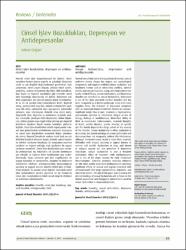| dc.description.abstract | Normal sexual function is a biopsychosocial process; sexual problems almost always has organic and psychological components and requires multidisciplinary evaluation and treatment. Factors such as relationship conflicts, stresfull events, poor sexual education, aging, declining testosterone levels, medical illness, certain medications, and depressive disorder can contribute to sexual dysfunctions. Depression is one of the most prevalent medical disorders and has been recognised as a distinct pathologic entity from early Egyptian times. The character of depressive symptoms such as depressed mood, diminished interest or pleasure, significant weight loss or gain, insomnia or hypersomnia, psychomotor agitation or retardation, fatigue or loss of energy, feelings of worthlessness, diminished ability to think or concentrate; indecisiveness, recurrent thoughts of death, suicidal ideation, suicide attempt, or specific plan for suicide depends to a large extent on the severity of the disorder. Sexual dysfunction is often implicated in depression, but current nosology of sexual dysfunction and depression does not adequately address this relationship. Although decreased sexual desire is most often reported, difficulties with arousal, resulting in vaginal dryness in women and erectile dysfunction in men, and absent or delayed orgasm are also prevalent in depressive individuals. Sexual dysfunction is also a frequent undesirable effect of treatment with antidepressants and is one of the major reasons for early medication discontinuation. Selective serotonin reuptake inhibitors are the most widely prescribed antidepressants and have significant effects on arousal and orgasm compared with antidepressants that target norepinefrine, dopamine, and melatonin system. The aim of this paper was to review the phenomenology of sexual dysfunction and to focus on the clinical assessment and therapeutic interventions used for sexual dysfunction in depressed patients. | en_US |



















